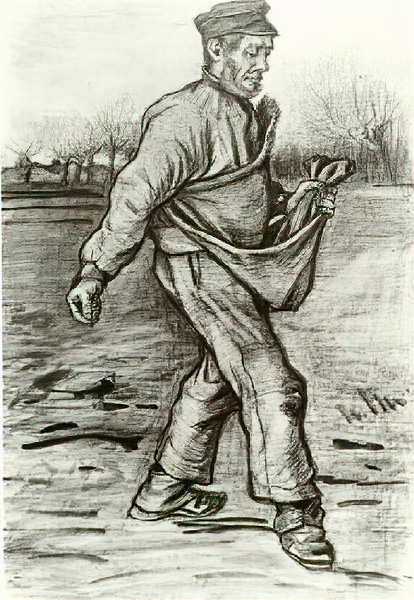This Sunday’s responsorial psalm contains these beautiful words: ‘Those who are sowing in tears will sing when they reap. They go out full of tears carrying seed for the sowing; they come back full of song, carrying their sheaves.’
Anyone who has done, and who still does, any gardening, knows that the antithesis of tears and song is not so far off the mark. When I was in ministry in Hastings, I started a vegetable garden. The soil is so rich in the area they would say, ‘if you plant an ice block stick, it will grow!’
They neglected to mention oxalis and convolvulus also grow.
Sowing is a beautiful occupation, but it calls for hard work: the ground needs be prepared, the seed sown, then there is regular watering and aftercare.
The first green shoots bring an up-tempo beat of the heart (and if you are like me, a moistening of the eye!)
Then, after time, there is the delight in digging the new season’s potatoes, or a lettuce, cabbage, carrot, whatever.

Many of the great artists we admire know well the tears of sowing.
Once such artist is Vincent Van Gogh (1853 – 1890).
During his life, Vincent experienced poverty, loneliness, and much illness. At times life was so difficult for him that he felt he couldn’t go on.
Once he said, ‘It is getting too lonesome, too cold, to empty.’ Van Gogh’s greatest heartbreak was a failure to win recognition as an artist.
Most people who knew him considered him a failure.
He was only thirty-seven when he died and by then he had sold only one of his paintings. It was sold for a few hundred Francs.
He said, ‘Painting requires a lot of faith because one cannot prove at the outset that it will succeed.
“In the first years of hard struggling, it may even be a sowing in tears. But we shall check them because in the far distance we have a quiet hope of the harvest.’
In spite of everything, he persevered. And the harvest did come, though too late for him.
The day after his death a few of his friends came and decked out the small room where his coffin lay with some of his paintings. It was only then that they realized how beautiful those paintings were. Today his canvasses are almost beyond price.
May the words of Vincent van Gogh, ‘Life is only a kind of sowing; the harvest is not here,’ echoing the words of today’s Psalm, ‘sowing in tears, they will sing when they reap’ fall on rich soil.
Footnote: Van Gogh had a special interest in sowers throughout his artistic career. All in all, he made more than 30 drawings and paintings on this theme.
For more information on Vincent Van Gogh there is a worthwhile book titled, Van Gogh’s Untold Journey, Revelations of Faith, Family, & Artistic Inspiration – William J Havlicek, PhD.
